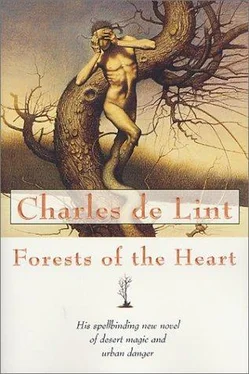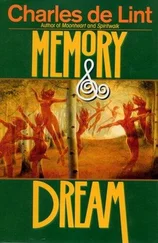“Go there,” Bettina’s father told her. “Light a candle for the inocente and pray.”
“I will, Papa.”
He ruffled her hair. “I have heard of these cadejos, you know. When I lived in Sonora, the elders still had stories of them. There were two: la cadejo bianco y la cadejo negro. Like yours, they both had the feet of goats instead of paws, but their eyes were like fire, burning like the deep hearts of the volcanoes that birthed them. La cadejo bianco, it was said, was the good one, the one who helped people, while la cadejo negro made people lost.”
“Truly?” Bettina asked.
“Verdaderos. In those days, many people would say they had seen them, and one of the elders once told me that la cadejo negro was the good one really.”
“And they said only that? There was only a white and a black one in those stories?”
Her father shrugged. “You know how stories are now—there is no one way to tell them anymore. This had already begun before I came to Sonora.” He smiled, teeth flashing in the dark. “I have never heard of your brightly colored volcano dogs. But there are so many things we have never heard of, you and I, and yet they are true, eh?”
Bettina nodded.
“Still there have always been stories of los perros misteriosos among our people. A dog is never simply what we think we see. He keeps us safe from the wolf and coyote, but deep in su corazon he is a wolf, a coyote. He is the one that can walk between the worlds, who leads us in the end to Mictlan.”
Bettina shivered at the mention of the land of the dead. It could seem too close on a night so dark, with her father telling his spooky stories.
Her father smiled at her reaction. He lowered his voice dramatically “Only the dog may go into the underworld and return. He leads us there, but he can also lead us into the other worlds, just as your cadejos. He is descended from the clown dog of the old gods, as you know, fickle and unpredictable.”
Bettina remembered that story from another night of storytelling.
“La Maravilla,” she said.
“Sí. When he comes for us, we know we have no choice. We must follow where he leads.”
“Now I’m scared,” Bettina said. “Did los cadejos come to take me back to Mictlan?”
“No, no, chiquita. But all dogs are spirits. They carry potent brujería, so we must always be careful in our dealings with them. Death is the gift we offer to the world in thanks for the life it has given to us, but no one should seek it out.”
“All dogs?”
Her father shrugged. “You will know them when you see them, los perros misteriosos. And remember, they bring the little deaths, too: sleep, dreams, change, the step from this world into la epoca del mito. You don’t need to be afraid of them, but you should respect them.”
“I will try, Papa.”
“And go to the shrine with your abuela. If she can’t take you, I will.”
Bettina nodded, then stifled a yawn, tired once more.
“I must go,” her father said. “Do you want to come home with me?”
They were so different, her mamá and papá. Mama would never even ask such a question. But she loved them both, he for his mystery, she for the home she made in their house, in their kitchen, in her heart.
“No, Papa,” she said. For then he would have to forsake his hawk’s flight to walk her home. “Thank you for coming.”
“You are my blood, chiquita. How could I do less?”
He kissed her on the brow, then stood. So tall, Bettina thought. He and all her India uncles. She heard him strike a match, light his cigarette.
“I love you, Papa,” she said.
“Teamo también,” he told her, but she was already asleep. “I will look in on you in the morning.”
There were hawks in the sky when Bettina woke the next morning, a half-dozen of them, dark against the dawn clouds. Brujo spirits, riding the high thermals.
“Tu papá y suspeyoteros,” Abuela said. “You called to him as you did to me—when you were in la epoca del mito.”
Bettina nodded, remembering—that and something else.
“He was here last night,” she said. “Mi papá.”
Abuela nodded. “I was out walking among the uncles and aunts and saw him on my return, hawk wings lifting him into the early dawn.”
“He told me to ask you to take me to the shrine of the inocente. ”
“Because of los cadejos.”
Bettina nodded.
“It is a good thought.” Abuela paused for a moment. “But I have been thinking, too. Had they meant you harm, they would not have brought you back to us as they did. I believe they are your medicina guides.
“But Papa said—”
“We will go to the shrine and burn a candle,” Abuela assured her. “If they mean you ill, the spirit of the inocente will drive them from you. But if they are your friends, the spirit will know and he will leave them untouched.”
When they returned home that evening, Bettina went to evening mass with her mother. She wanted to talk to Mama about her experience in I’itoi’s cave, how Papa had come to her, crossing the Tucsons and the desert on his hawk wings, but it was a conversation she couldn’t even begin. So she sat beside her mother, listening to the priest with her hands folded on her lap, and went up to the rail for communion. Afterwards, she waited with her mother by the confession booth, but when her turn came, she could no more speak to the priest about it than she could to her mother.
Was that a sin? she wondered as she confessed to arguing with her sister and a half dozen other small transgressions. Would God understand?
She wasn’t sure that he would, but she knew the Virgin did. Throughout the service Bettina’s gaze had been drawn, as it invariably was, to the Virgin’s statue with its blue and white robes, her serene presence. The Virgin had lived in a desert, too. Surely she had been aware of the small misteriosos, before the miracle birth of her Son.
Later she did tell Adelita.
“I saw Papa today,” she said as they lolled on a bench they had made in the backyard by placing a found board on matching stacks of adobe bricks. “Out in the desert.”
There were no flowers in their small garden—only herbs and vegetables and the cacti that had been there before their house had been built. Neither Mama nor Abuela understood the concept of watering plants that one could not eat. It was one of the few things on which they agreed.
“He and nuestros tios.” she added.
“They aren’t really our uncles,” Adelita said.
“I know that. But I like them all the same.”
Adelita said nothing. She scuffed at the dirt with her toe, a little put out because Mama wouldn’t let her go off with her friends this evening.
“They were in their hawk shapes,” Bettina said.
That made Adelita laugh. “You can be such a little child.”
“I am not.”
“Then why do you still believe in los cuentos de hadas?”
“It’s not a fairy tale.”
Adelita gave a practiced adult shrug.
“You weren’t always this way,” Bettina said.
“No,” her sister agreed. “But I grew up. One day you will, too.”
“I will never grow up if growing up means no longer seeing the truth.”
“Then they will lock you away with all the other locos.”
Early Monday morning, when the dawn was still pinking the sky and long before Bettina had to be at school, Abuela walked with her along the river-bank to the shrine of the inocente. They walked quietly but still startled up coveys of Gambel’s quail and doves. When a roadrunner crossed the path ahead of them, Bettina stopped, her pulse quickening.
Читать дальше












